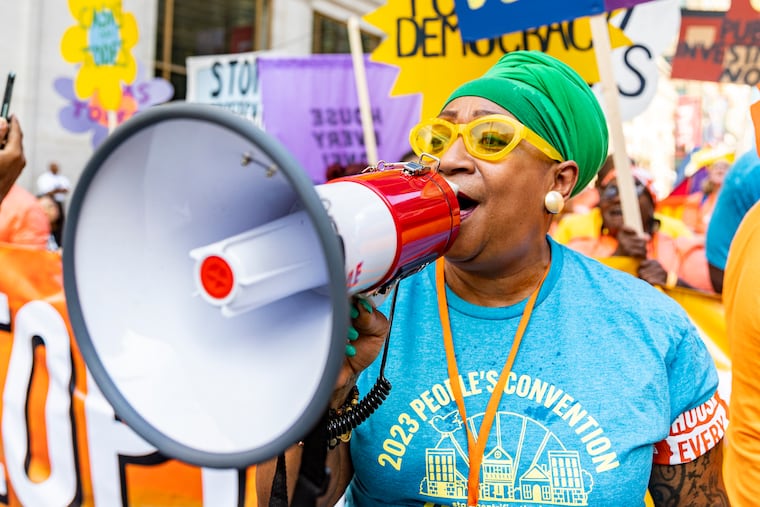Protesters rallied for affordable housing as Philadelphia grapples with eviction-related shootings
Local advocates — coming off news of a third eviction-related shooting involving one of the city’s deputized landlord-tenant officers — rallied alongside those attending a national convention in town.

Lowell Faison has seen the housing affordability crisis push poor renters to the brink.
Some renters, the 75-year-old said Saturday outside of City Hall, have been forced tens of miles outside city limits in search of cheaper rents. Others, Faison said, lost their housing entirely during the fog of the pandemic.
He wasn’t talking about Philadelphia. Faison is from Charlotte, N.C., but was in Philadelphia on Saturday, joining an estimated 2,000 protesters — many of them also from out of state — to express their concern for what they see as a national crisis reaching its breaking point.
“When it comes to housing, local governments have to step up,” Faison said. “There’s no question about it.”
Protesters hailed from New York state and Pennsylvania, but also the Deep South and beyond, many drawn to town for a national convention held by the Center for Popular Democracy, a left-leaning political group, and other housing advocates. The rally proved a fitting end to the convention in a city where housing advocates are grappling with news of a third eviction-related shooting episode involving one of the city’s deputized landlord-tenant officers.
Faison stood against a sea of signs urging “Protect Tenants” and “House Every One.” Some carried empty tents, what often end up becoming homes for those forced from housing due to skyrocketing rents.
The movement came at a critical moment for Philadelphia housing advocates, as just several days before, Philadelphia courts announced a pause on evictions.
The decision came after a deputized landlord-tenant officer shot a 33-year-old Kensington woman in the leg while enforcing a lockout — the third time such an officer fired a weapon during an eviction in Philadelphia since March. A spokesperson for the First Judicial District said Wednesday that the court-appointed landlord-tenant officer, lawyer Marisa Shuter, and her employees and contractors who enforce evictions would not conduct lockouts until they had received the most up-to-date training on use of force and de-escalation.
Faison was unaware of these tensions, which began brewing in April when another landlord-tenant officer shot a 35-year old woman in the head (she survived her injuries). When told of them, his voice became angrier, but he wasn’t particularly surprised.
“Violence is as American as apple pie,” Faison said.
Other protesters were keen to the issue, noting that it was impossible to ignore that landlords paid Shuter’s office to contract for its services.
Saturday’s rally was less focused on the shootings than the April gathering outside Shuter’s Center City office, when a large crowd called for an end to the city’s eviction practices.
Instead, Democratic politicians such as Pennsylvania State Sen. Nikil Saval and Philadelphia’s District 3 Councilwoman Jamie Gauthier touched on the broader issue of housing affordability.
While Philadelphia has enjoyed lower rents than other large metropolitan cities, lower incomes and poverty have nonetheless increased the housing burden. Nearly three in five residents — and particularly Black Philadelphians — said affordable housing should be a top priority for the city, according to a Lenfest Institute survey released in May
Gauthier said she was working on Council to protect 12,000 affordable units across the city, some that face similar fates as the beleagiered UC Townhomes.
Tenants from the West Philadelphia affordable housing complex rallied for months after learning its owner was seeking to sell the property, ending federal housing subsidies that made renting possible for generations of families.
The yearslong campaign resulted in an agreement in April with the city to develop at least 70 replacement units.
“We know that the most affordable home is the home that you already live in,” Gauthier told the crowd.
Saval, who represents the state’s 1st District, which covers much of South and Central Philadelphia, lauded the recent passage of the Whole-Home Repairs program in Harrisburg, a fund that helps county agencies address habitability concerns and make units accessible for people with disabilities.
The intersectional crowd Saturday drove home a point: that the housing crisis is all-encompassing. For some members of Gen-Z, those born between 1997 and 2012, it’s lasted the entirety of their adult lives.
Emily Rodriguez, a 21-year-old college student from Brooklyn, recalled memories of her childhood in Williamsburg, before it was gentrified. Music flowed from the street, she said, while aunts and uncles played dominos and small street vendors lined the corners.
Rent hikes meant Rodriguez saw an influx of wealthier residents and high-end stores such as Apple and Whole Foods — and the flight of longtime Latino neighbors. She warned the crowd that this experience was far from unique to New York.
“Many of us here today have lost homes and been displaced from their communities,” Rodriguez said. “This experience happens every single day across the country.”